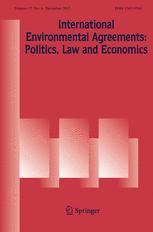
Exploring national and regional orchestration of non-state action for a < 1.5 °C world
Chan, Sander / Paula Ellinger / Oscar WiderbergExterne Publikationen (2018)
in: International Environmental Agreements: Politics, Law and Economics 18, 135-152
DOI: https://doi.org/10.1007/s10784-018-9384-2
Information
The importance of actions by non-state and sub-national actors (e.g., companies and cities) is increasingly recognized, because current governmental commitments are insufficient to limit the increase of global temperatures to 1.5 °C. Orchestration, the alignment between ‘orchestrator’ (e.g., international organizations and governments) and ‘intermediaries’ (e.g., city networks and partnerships), could harness additional contributions by building catalytic linkages and by enabling a growing number of actions. Although most orchestration efforts have been made in the context of international climate negotiations, regional and national orchestration could be useful by contributing to the implementation of national commitments, and by inspiring greater ambition. We investigate whether and how regional and national orchestrators respond to shortfalls in international orchestration. Using insights from a comparative study, we provide an early indication of the catalytic potential of orchestration in Latin America, Europe, India, Argentina, and Sweden. We find considerable impacts of global level orchestration on the emergence of these initiatives, however orchestrators do not simply copy other efforts; they emphasize different catalytic linkages, including the engagement of underrepresented actors; implementation; and, the provision of ideational and material support. Catalytic linkages in a complex landscape with multiple orchestrators could sometimes be improved through coordination. Given the enormous scale of transformation needed, a focus on scale may seem natural. However, for socially just outcomes, orchestrators need to resist a sole focus on scale, and also aim at experimental and small-scale actions, which may not lead to immediate large-scale impacts but which may prove crucial in longer-term transformations.

